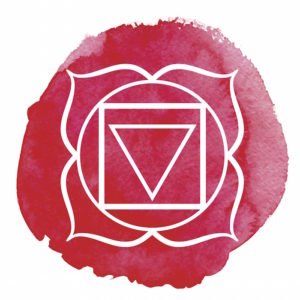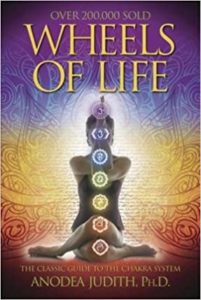The reiki attunement cycle begins anew! For the second time, I’m sitting with my root chakra, and let me tell you, it’s . . . better. I sent an email that would’ve been quite hard for me before all of this: I laid bare my needs with clarity, and didn’t even break a sweat. I felt the anxiety, respected it, and spoke it, certain of myself and my worth, driven by a need to ground myself on a solid foundation. Last-month-me would’ve been impressed; last-year-me wouldn’t have believed it!
To celebrate, here are some of my favorite excerpts from Wheels of Life: The Classic Guide to the Chakra System, by Anodea Judith.
Root Chakra

There is a common belief within spiritual philosophies that we are “trapped” in physical bodies, awaiting release from this bondage. This belief supports the denigration of the body and perpetrates the mind/body split. This denies access to the vast beauty and intelligence that our bodies store in their trillions of cells.
When our survival is threatened, we experience fear. Fear is a demon of the first chakra – it counteracts the sense of safety and security that the first chakra ideally brings. Inappropriate levels of fear can be a sign that the first chakra foundation is damaged. Facing our fear can help us wake the first chakra up.
Without grounding, we are unstable. We lose our center, fly off the handle, get swept off our feet, or daydream in a fantasy world. We lose our ability to contain, to have, or to hold. Natural excitement, or charge, becomes dissipated, diluted, and ineffectual. When we lose our ground, our attention wanders from the present moment, and we appear to be “not all here.” In this state, we feel powerless and, like a viscous circle, may no longer want to be here.
Our roots are made from our guts – the instinctual feelings that get programmed from the memories of our past, our racial and cultural heritage, and the indestructible fabric of our being. C.J. Jung describes this instinctual base as the realm of the collective unconscious – a vast and powerful realm of inherited instincts and evolutionary trends. When we reclaim these roots, we strengthen who we are, and draw on the vast wisdom of this instinctual realm.
In today’s urban world, there are few people who are naturally grounded. Our language and cultural values reflect the superiority of the high at the expense of the low, i.e., to be highly regarded, to hold one thing above another, to get high, to have things look up. Socially and economically, intellectual work is better rewarded than physical labor. Our natural bodily processes such as waste elimination, sexuality, birth, breastfeeding, or nudity are considered dirty, to be done in private and often with much guilt. Control of our health is put in the hands of an elite class, denying us the sense of our own healing potential. Our power structures in business, government, and organized religion flow hierarchically, from the top down, controlling and often trampling that which is below in order to serve the “higher cause” of that which is above.
By losing touch with our ground we have lost the sense of our intricate connection with all life. We become ruled by a part instead of the whole – and, furthermore, a part that is isolated, fragmented, and out of touch. Ignoring our ground, it is no wonder that we face a health care crisis and ecological destruction.
In an “ungrounded” culture, where most values do not favor the body or its pleasures, we develop pain. Our bodies hurt after a day at the computer or a day of driving. The stress of competition and fast living do not give us a chance to rest and renew, or to process that hurt, to release it. As we develop pain, we become, ironically, more resistant to grounding, for to ground is to be “in touch.” Getting in touch means feeling that pain. Yet this is the first step in making ourselves whole so that we begin to heal.
Many people experience difficulty because their upper chakras are too open, while their lower chakras are not stable enough to support the barrage of psychic energy they pick up around them. At its extreme, this creates serious mental disorders, such as psychosis. A psychotic individual has lost touch with his ground and with consensus reality. Through techniques of grounding, psychic overload can be discharged, giving patients stability to match their sensitivity.
Getting grounded implies limitation. While frightening to some people, this limitation is an essential creative principle. If we didn’t limit our activities, we would accomplish nothing. If I didn’t limit my thoughts as I typed this manuscript, I couldn’t write. Far from being negative, limitation creates a container that allows energy to build and gel into substance. To manifest, we must be willing to accept limitation. Grounding is a harmonious acceptance of natural limitation. It is just as crucial to the development of consciousness as any meditation or raising of energy.
One who is perpetually plagued by health problems or constantly struggling with financial crisis is caught on this first chakra level. Some unresolved conflict, whether it be physical, circumstantial, or psychological, is keeping their consciousness trapped at this level. There is usually an insecure, panicky feeling – one which may pervade other areas of life, even when there is no need for it. As long as these situations remain unresolved, the person will have difficulty raising any appreciable amount of consciousness to higher levels. It is important to understand the ramifications of consciousness at this root level, namely, the right to be here.
If this is your experience, ask yourself, what keeps you from wanting to be here? From who do you need permission to take care of yourself? What is the fear of grounding, or becoming stable, of standing on your own two feet? Who is responsible for your survival? How much of your thinking is unrealistic dreaming, not grounded in the world around you? How was your survival provided for in childhood, by whom, and at what cost? Are you connecting with your body, listening to it, administering to its needs? Do you have the right to be here, to take up space, to have what you need in order to survive?
Developing our ability to have begins with increasing self-worth. Paradoxically, allowing ourselves to have more also increases our self-worth, both literally and figuratively. It helps to look objectively at what we allow ourselves to have, in terms of money, love, time to ourselves, rest, or pleasure. When we look closely at what we allow ourselves to have, we get a chance to laugh at ourselves – to see the discrepancies between what we could have and what we allow ourselves to have. Somehow, taking care of ourselves has been depicted as selfish or evil. Yet, not taking care of ourselves results in the need to compensate in some other area, or have others provide for us.
In order to fully be here, we must be able to assert ourselves, to claim our own place in the world, and to secure our survival. We need to raise our ability “to have” high enough to fit our needs. If our unconscious says, “No, I don’t deserve it,” our conscious minds are given an extra obstacle to overcome.
Being in survival mode is a cue to “wake up” – to heighten our awareness, to examine our foundation: our ground, our body, and the Earth. This is the purpose of the first chakra. It is where we begin, and where we rest at the end of the journey.
To validate the body is to identify with it. If my chest is hurting, I admit that my emotional heart is hurting. To consolidate ourselves at this level, we must make peace with our body so that we can be at peace in our body.
To understand the body, we have to be the body. We have to be its pain, its pleasure, its fear, its joy. To see the spiritual being as separate is to cut ourselves off from our ground, our root, our home. We become less than whole, split, out of touch with the information our bodies can communicate.
This is not to deny the philosophies that state “you are not your body, but something more” but to enhance them. We are our bodies, and through that understanding we can become something more. We become ground, all there, in touch with all that goes on inside us. We more fully experience the spiritual and emotional parts of ourselves, for which the body is a vehicle.

Now go buy the book! Allow yourself to have it!